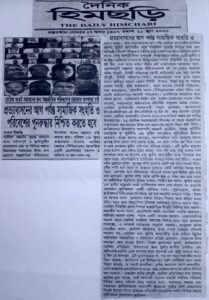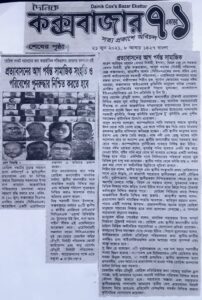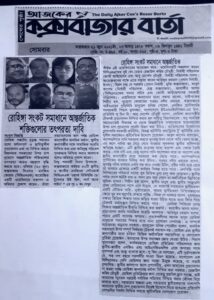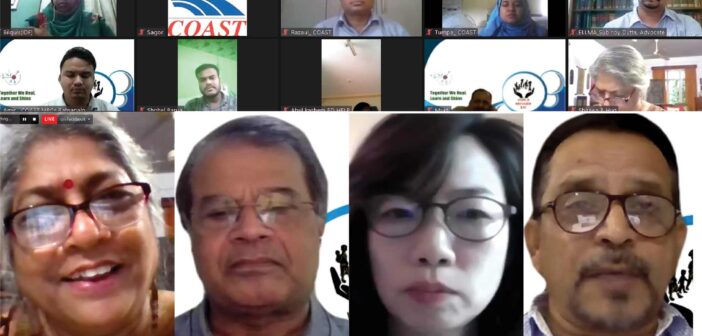Dhaka, 20th June 2021. The ultimate solution to the Rohingya crisis is the dignified repatriation, and to ensure that, there should be a redoubled effort from international actors for putting pressure on the Myanmar government. Speakers participated in a webinar hosted by Cox’s Bazar CSO NGO Forum (CCNF) opined these. They also urged all stakeholders to ensure the human dignity of the Rohingya community, social cohesion until the repatriation.
On the occasion of World Refugee Day, CCNF, a network of 50 NGOs working in Cox’s Bazar organized the webinar title ‘World Refugee Day: Together We Heal, Learn and Shine’. The webinar was jointly moderated by two Co-Chairs of CCNF Rezaul Karim Chowdhury, Executive Director COAST Foundation, and Abu Morshed Chowdhury, Executive Director-PHALS. Arifur Rahman Chief Executive YPSA, Bimal Chandra Dey Sarker, Chief Executive Mukti Cox’s Bazar, Abul Kashem, Executive Director of HELP Cox’s Bazar, Jahangir Alam Member Secretary of CCNF, and Assistant Director of COAST Foundation placed specific interventions on behalf of the organizers. Among others, Ms. Shireen Haq of Naripokkha, Mr. Gowhar Nayeem Wahra of Disasater Forum, Mr. Manuel Moniz Pereira of IoM in Cox’s Bazar, Mr. Pius Mulonzya of NGO Platform Coordinator, Ms. Soo Jin Rhee, Deputy Representative, UNHCR spoke at the occasion.
Abu Murshed Chowdhury said, Myanmar holds the main responsibility to ensure sustainable repatriation for the Rohingya community. International actors should redouble their effort, they should not be only limited to humanitarian assistance. Along with the UN initiative, government diplomacy and track two civil society diplomacy are needed too.
Abul Kashem said, underground water is being used to supply water to the camps, thus local residents including farmers are suffering since the water level has been gone down. It is making frustration and grievance among local people. Utilizing water from the Naf River and Reju Khal canal can be an effective alternative. Plastic use should also ban in the camps. Gowhar Nayeem Wahra said, groundwater exploration must be stopped immediately, rainwater harvesting can be a successful option in this regard. Instead of an LPG gas cylinder, a rice husk-based coking solution should be promoted. Dry fish and salt purchasing will ensure economic integration.
Ms. Shireen Haq said, local people and local organizations were the very first responders, but that is why localization of aid is a rational demand. Unfortunately, we can see very little development in ensuring localization. Bimal Dey Sarker said, Youth should be involved with skill-based education so that they can ensure sustainable employment while they will back. We need to ensure certification of the education of the camp. Jahangir Alam said, social cohesion is a must until repatriation. Arifur Rahman said, trafficking is an organized crime. Many people including influential are trapping Rohingya people to be the victim of trafficking. We need to promote awareness of this.
Manuel Moniz Pereira said, total dependency on humanitarian support is not a sustainable solution. Demand-based economic cooperation and communication among the Rohingya and host communities need to be promoted. Afforestation should get emphasize as much as possible, agroforestry should also get attention. Pius Mulonzya, for the effecting Rohingya response management Local-national NGOs and INGOs should have good relations and trust with each other.
Soo Jin Rhee said, it is unfortunate that, during the last 10 years, the number of refugees has been doubled. Bangladesh has opened the door for more than one million Rohingya, which is really worth appreciated. The sacrifice of the local people is praiseworthy, now, we need to ensure the dignity of the Rohingya people until the repatriation. Rezaul Karim Chowdhury, as the fund is decreasing for the Rohingya response, we need to think of maximum services with minimum expenditure. He also said that, along with aid transparency and localization of aid we need to consider third country repatriation, and communication with neighboring countries is needed.
Download related paper [Bangla Press] [English Press] [Presentation]
National News Link
 |
|
 |
 |
 |
|
 |
 |
 |
|
 |
 |
 |
 |
 |
 |
 |
|
Cox’s Bazar Newslink:
 |
 |
 |
 |
 |
 |
 |
 |
 |
 |

